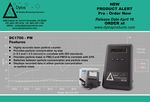Indoor Air Quality (IAQ) in aged-care centres in Victoria - ACSA
←
→
Page content transcription
If your browser does not render page correctly, please read the page content below
Indoor Air Quality (IAQ) in aged-care centres in Victoria Enhanced Indoor Air Quality (IAQ) for Improving the Well-being of Vulnerable Population in Victoria A research project funded by the Virtual Centre for Climate Change and Innovation, the Department of Environment, Land, Water and Planning (DELWP), Victoria. image credits: pixabay.com
Background Climate change has deteriorated the air quality of cities leading to increased temperature, level of carbon dioxide and other pollutants such as dust and allergens. Extreme weather events such as heatwaves and thunderstorms are rising. The relationship between the external environment and indoor air quality is well researched. While most researches on indoor environments and pollution have focused mostly on the general pop- ulation, recent studies on aged-care centres have found that indoor pollution may adversely affect both cardiovascular and respiratory systems in humans and that the elderly are at higher risk of suffering from such illnesses than other age groups (Maio et al., 2015; European Lung Foundation, 2015). Furthermore, a Johns Hopkins University study also found a correlation between high indoor temperature, indoor air pollution and worsening conditions of Chronic Obstructive Pulmonary Dis- ease - COPD (McCormack et al., 2016). A United Nation’s estimate projects that the number of older persons (above 60 years old ) will more than double by the year 2050, rising from 962 million globally in 2017, to 2.1 billion (UN, 2018). In Aus- tralia, people aged 65 years and older made up 14% of the population in the year 2012. This popu- lation proportion is projected to increase to 22% by 2061 and 25% by 2101. Similarly, the proportion of people aged 85 years and over in 2012 was 2% of the population, this group is also projected to grow rapidly to 5% by 2061 and to 6% by 2101 (Australian Bureau of Statistics, 2013). With an increase in life expectancy in most developed economies, many more elderly will require or use the services of aged-care centres; and because most of the elderly in industrialized countries spend almost all of their time indoors (Maio et al., 2015; Aguiar et al., 2014), the need to ensure they are not unnecesarily exposed to indoor pollutants becomes very crucial. A number of studies in other countries have found the elderly susceptible to potential indoor pollutants even at low concen- trations (European Lung Foundation, 2015; Aguiar et al., 2014). However, scientific studies on IAQ related impacts on the health of aged-care centre residents in Australia are limited. About the Project Literature has established a strong relationship between the quality of indoor air and the health of residents of aged-care centres (McCormack et al., 2016; European Lung Foundation, 2015; Aguiar et al., 2014). Some recent studies on air quality in aged-care centres in Europe found that the residents in many of these centres are exposed to high levels of indoor pollutants. Most of these pollutants were found to come from sources such as heaters, building materi- als, cleaning products, disinfectants and cooling systems (Maio et al., 2015; Aguiar et al., 2014; Mendes et al., 2013). Many of the pollutants were also correlated to worsening health condi- tions of the residents. This project will investigate the indoor conditions of selected aged-care centres in Victoria in order to better understand indoor air quality. It will also address the lack of quantitative studies on the state of IAQ in aged-care centres.
Project Activities
The proposed project involves the following phases:
PRE-EVALUATION PHASE
• Monitoring of indoor air conditions (temperature, relative humidity, carbon dioxide (CO2)
concentration levels, particulate matter and other allergens.
• Assessment of Indoor air quality, ventilation and thermal conditions of aged-care centres.
• Survey of residents and staff on perception of indoor conditions and their health and
well-being.
Some of the equipment to be used during the pre-evaluation phase of the study
INTERVENTION PHASE
• Installation of fresh filtered air ventilation systems and monitoring sensors in selected are-
as of aged-care centres - Identification of locations shall be in consultation with the aged-
care centres’ facilities management.
Some of the equipment to be used during the intervention phase of the studyPOST-EVALUATION PHASE
• Monitoring of indoor air conditions (temperature, relative humidity, carbon dioxide (CO2)
concentration levels, particulate matter and other allergens.
• Assessment of indoor air quality, ventilation and thermal conditions of aged-care centres
post installation of fresh filtered air ventilation systems.
• Post installation survey of residents and staff on perception of indoor conditions and their
health and well-being.
Cost and Project Timeline
There are no installation, maintenance or reporting costs to participating aged-care centres
and all costs will be fully covered by RMIT University. On completion of the project, the venti-
lation units will be removed and the surfaces will be reinstated as nearly as practicable to the
original conditions before the installation. Should the partner aged-care centre be interested in
keeping the ventilation units, these will be left as installed free of charge.
Project is proposed to commence in July 2018; investigation phase will start by January 2019
and end by December 2019. Project completion will be in June 2020.
Reporting on Confidentiality , Ethics and Publication
Approval for the project will be obtained from the aged-care stakeholders and RMIT University
College Human Ethics Advisory Network.
All information and data collected will be aggregated and the names of the aged-care facilities
and buildings will not be published. No personal data of the participants will be collected.
Aged-care stakeholders will have the opportunity to review and provide comment on any ma-
terials generated from the research prior to scholarly publications.
Sustainable Building Innovation Laboratory (SBi Lab)
RMIT University
School of Property, Construction and Project Management
Associate Professor Priyadarsini Rajagopalan
Project Leader
Telephone + 61 3 9925 2293
Fax + 61 3 9925 1939
Email: sbilab@rmit.edu.auYou can also read



























































